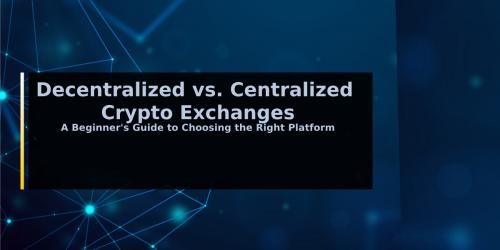Centralized (CEX) vs. Decentralized (DEX) Cryptocurrency

Venturing into the world of cryptocurrencies can be akin to navigating a maze, especially when it comes to choosing between Centralized Exchanges and Decentralized Exchanges. In this user-friendly guide, we'll demystify the complexities, providing you with a clear path to understand the differences and make an informed choice tailored to your needs.
Centralized Exchanges (CEX):
Centralized exchanges, or CEX, are the traditional gateways to the cryptocurrency market. Think of them as digital versions of banks, where users deposit funds into their accounts on a centralized platform. Here's what you need to know:
User-Friendly Interface:
CEX platforms are designed with simplicity in mind. Intuitive interfaces make it easy for beginners to navigate, trade, and manage their assets without feeling overwhelmed.
Security Measures:
Well-established CEX platforms prioritize security, implementing robust measures to protect user funds. With features like two-factor authentication and encryption protocols, they aim to provide a secure trading environment.
Liquidity and Trading Volume:
Centralized exchanges usually boast high liquidity, resulting in faster transactions and better pricing. The large user base contributes to a vibrant marketplace, making it ideal for those who value quick and efficient trading.
Decentralized Exchanges (DEX):
Decentralized exchanges, or DEX, operate on blockchain technology, eliminating the need for intermediaries. Here's a glimpse into the unique features of DEX:
User Empowerment:
DEX platforms empower users by allowing them to retain control of their private keys. Transactions occur directly between users, eliminating the need for a central authority and giving a sense of ownership.
Privacy and Anonymity:
DEX often appeals to users who prioritize privacy, as many platforms do not require Know Your Customer (KYC) verification. This means users can trade without disclosing personal information.
Censorship Resistance:
Operating on a decentralized network, DEX platforms are resistant to censorship. This is a crucial feature for users who value the principles of decentralization and want to avoid regulatory constraints.
Making an Informed Choice:
Your choice between CEX and DEX ultimately depends on your preferences and priorities. If you're looking for a user-friendly experience, high liquidity, and a secure environment, a centralized exchange might be the right fit. On the other hand, if you prioritize privacy, user empowerment, and the principles of decentralization, a decentralized exchange could be more aligned with your goals.
Conclusion:
As you navigate the crypto maze, armed with the knowledge of centralized and decentralized exchanges, remember that there's no one-size-fits-all solution. Each type has its unique strengths and caters to different preferences. Whether you choose the familiar terrain of a centralized exchange or the uncharted territory of a decentralized platform, the key is to stay informed and embrace the exciting possibilities of the evolving crypto landscape.
Advertise on APSense
This advertising space is available.
Post Your Ad Here
Post Your Ad Here
Comments